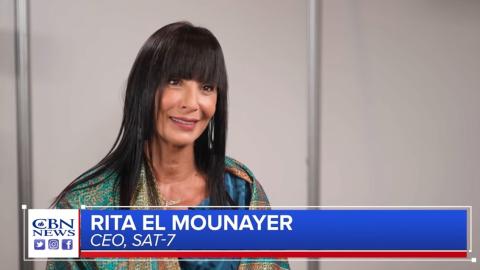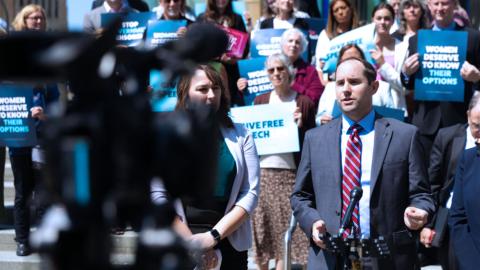
'God Uses Broken People': After Childhood in War-Torn Nation, She Is Bringing the Gospel to Millions
Rita El-Mounayer, CEO of the Christian media ministry SAT-7, knows what it’s like to grow up amid violence and chaos.
El-Mounayer recently shared her journey and testimony of being born in war-torn Lebanon in the 1970s, explaining how her early years shaped her later quest to spread the Gospel.
Listen to the latest episode of CBN’s Quick Start podcast
“It was not easy, especially that my mom was very sick and … this country lacked medical care, so she passed away during the war,” she said. “I was very young; I was seven, and my sister was five.”
El-Mounayer’s father was part of the Christian militia then, so she and her sister feared they’d lose their dad as well.
She recalled how her father helped build a love for media in both her and her sister. With the situation around the family both dangerous and unpredictable, she and her sister often stayed indoors.
“When the bombs were heavy outside, and it’s not safe to go outside or to play outside … we are either hiding in bunkers or the safest room in the house, where they put earth around the windows,” she said. “And my dad wanted to distract us. So, he will bring a TV set, and it’s black and white, and he will hook it to the car battery.”
At the time, the family didn’t have electricity, but the car battery helped run the TV and offer a welcome distraction for the children amid chaos unfolding outside.
“I don’t know what we were watching — just maybe Egyptian soap operas or cartoons,” El-Mounayer said. “And each time the bombs are louder outside, he will come sneak in and put the volume louder so we will be distracted and forget about the outside world and immerse ourselves with this virtual or fake world that is not real, but at least will be a refuge for us.”
A few years later, El-Mounayer and her sister became Christians, and those early years of media as a tool and refuge helped shape their destiny.
“We, I think, were determined to do something with media,” she said, noting how they both studied content and media and embarked on a journey to create programs with purpose.
At first, the focus was helping children see they’re not alone while also sharing the “love of Jesus.” Both women ended up working at SAT-7, with El-Mounayer now leading the entire ministry.
SAT-7 is one avenue through which biblical truth is reaching people in the Middle East and Africa. The ministry consists of four satellite channels — one for families, one for children, one broadcasting into Turkey, and another that goes into Iran and Afghanistan. There’s also a video-on-demand service and social media outreach.
With satellite technology so prevalent in the Middle East and North Africa, these channels are pivotal to SAT-7’s mission. Many families with little money or means still have a TV and satellite dish, enabling them to access the content and encounter Jesus.
El-Mounayer also reflected on another powerful act her father took when the violence outside the family’s home intensified. He would also lovingly cover their bodies with his own, ensuring their safety if a bomb or bullet came through the wall.
“He will come and … cover us with his body, so if something happens to us … he will … pass away, not us,” El-Mounayer recalled. “And this picture of a dad protecting us was our picture of God the Father — that, whatever happens, He is there; whatever happens, He is not going to leave us. He is our defender.”
That’s a lesson she now hopes to instill in others through the work of SAT-7, noting how her own story of brokenness — and the journeys of others from nations across the globe — have prepared her to serve others who also face difficult circumstances.
“God used broken people like us,” she said. “A lot of times, we think, to be called into the ministry, we need to be perfect, or we need to be holy or spiritual, or everything is great in our life,” El-Mounayer said. “It’s not true. … God uses broken people like us because we can feel with … brokenness of other people.”




